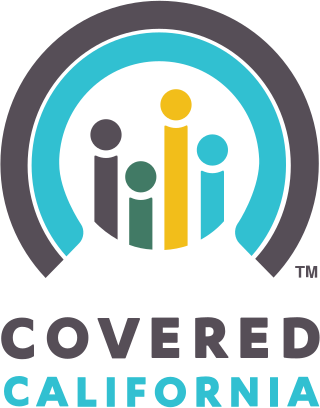The California Healthy Families Program (HFP) was the California implementation of the federal Children's Health Insurance Program (CHIP) that provided low-cost insurance offering health, dental, and vision coverage to children without insurance that did not qualify for Medi-Cal. [1]
As a federal program, it was administered by the U.S. Department of Health and Human Services (HHS), and California Managed Risk Medical Insurance Board (MRMIB) at the state level.
As a result of the 2012-2013 budget deal, nearly 900,000 children will be moved from the HFP into Medi-Cal beginning in 2013. [2]

In the United States, Medicaid is a government program that provides health insurance for adults and children with limited income and resources. The program is partially funded and primarily managed by state governments, which also have wide latitude in determining eligibility and benefits, but the federal government sets baseline standards for state Medicaid programs and provides a significant portion of their funding.
Health insurance or medical insurance is a type of insurance that covers the whole or a part of the risk of a person incurring medical expenses. As with other types of insurance, risk is shared among many individuals. By estimating the overall risk of health risk and health system expenses over the risk pool, an insurer can develop a routine finance structure, such as a monthly premium or payroll tax, to provide the money to pay for the health care benefits specified in the insurance agreement. The benefit is administered by a central organization, such as a government agency, private business, or not-for-profit entity.

The Children's Health Insurance Program (CHIP) – formerly known as the State Children's Health Insurance Program (SCHIP) – is a program administered by the United States Department of Health and Human Services that provides matching funds to states for health insurance to families with children. The program was designed to cover uninsured children in families with incomes that are modest but too high to qualify for Medicaid. The program was passed into law as part of the Balanced Budget Act of 1997, and the statutory authority for CHIP is under title XXI of the Social Security Act.
Single-payer healthcare is a type of universal healthcare in which the costs of essential healthcare for all residents are covered by a single public system.

Los Angeles County Department of Health Services operates the public hospitals and clinics in Los Angeles County, and is the United States' second largest municipal health system, after NYC Health + Hospitals.
The California Medical Assistance Program is the California implementation of the federal Medicaid program serving low-income individuals, including families, seniors, persons with disabilities, children in foster care, pregnant women, and childless adults with incomes below 138% of federal poverty level. Benefits include ambulatory patient services, emergency services, hospitalization, maternity and newborn care, mental health and substance use disorder treatment, dental (Denti-Cal), vision, and long-term care and support. Medi-Cal was created in 1965 by the California Medical Assistance Program a few months after the national legislation was passed. Approximately 15.28 million people were enrolled in Medi-Cal as of September 2022, or about 40% of California's population; in most counties, more than half of eligible residents were enrolled as of 2020.
BadgerCare Plus, known informally as BadgerCare, is a public healthcare coverage program for low-income Wisconsin residents created by former governor Tommy Thompson and modified by former governor Jim Doyle. The Wisconsin Department of Health Services oversees the program's implementation.
The Healthy Americans Act(HAA), also known as the Wyden-Bennett Act, is a Senate bill that had proposed to improve health care in the United States, with changes that included the establishment of universal health care. It would transition away from employer-provided health insurance, to employer-subsidized insurance, having instead individuals choose their health care plan from state-approved private insurers. It sought to make the cost of health insurance more transparent to consumers, with the expectation being that this would increase market pressures to drive health insurance costs down. The proposal created a system that would be paid for by both public and private contributions. It would establish Healthy Americans Private Insurance Plans (HAPIs) and require those who do not already have health insurance coverage, and who do not oppose health insurance on religious grounds, to enroll themselves and their children in a HAPI. According to its sponsors, it would guarantee universal, affordable, comprehensive, portable, high-quality, private health coverage that is as good or better than Members of Congress have today; A 2008 preliminary analysis by the Congressional Budget Office concluded it would be "essentially" self-financing in the first year that it was fully implemented.
Healthy San Francisco is a health access program launched in 2007 to subsidize medical care for uninsured residents of San Francisco, California. The program's stated objective is to bring universal health care to the city. Healthy San Francisco is not a true insurance program, as it does not cover services such as dental and vision care, and only covers services received in the city and county of San Francisco. The program itself acknowledges its limitations, and has stated that "insurance is always a better choice." Healthy San Francisco represents the first time a local government has attempted to provide health insurance for all of its constituents. The program is open to low-income city residents over the age of 18 who do not qualify for other public coverage, and who have had no insurance for at least 90 days. Eligibility is not conditional on citizenship, immigration, employment or health status. The program covers a range of services, but only pays providers within San Francisco. By July 2010, almost 90% of the uninsured adults in San Francisco — over 50,000 people — had enrolled in Healthy San Francisco.

Proposition 1D was a defeated California ballot proposition that appeared on the May 19, 2009 special election ballot. The measure was legislatively referred by the State Legislature. If approved, the proposition would have authorized a one-time reallocation of tobacco tax revenue to help balance the state budget.
The Managed Risk Medical Insurance Board (MRMIB) of California is a component of the California Health and Human Services Agency.

The Local Initiative Health Authority for Los Angeles County is a public agency that provides health insurance for low-income individuals in Los Angeles County through four health coverage programs including Medi-Cal.

Based in Oakland, California, the California Health Care Foundation (CHCF) is an independent, nonprofit philanthropy that focuses on improving the health care system for the people of California, especially low-income Californians. The organization has three main goals: improving access to coverage and care, promoting high-value care, and investing in people, knowledge, and networks that help to make meaningful change possible in California’s health care system.
The California Department of Health Care Services (DHCS) is a department within the California Health and Human Services Agency that finances and administers a number of individual health care service delivery programs, including Medi-Cal, which provides health care services to low-income people. It was formerly known as the California Department of Health Services, which was reorganized into the DHCS and the California Department of Public Health. On September 10, 2019, DHCS Director Jennifer Kent announced her resignation, effective September 30, 2019. On September 25, 2019, Governor Gavin Newsom appointed Richard Figueroa, Jr. as Acting Director. Will Lightbourne was appointed by Governor Gavin Newsom and began serving as Director on June 16, 2020. Subsequently, Michelle Baass was appointed Director of DHCS by Governor Gavin Newsom on September 10, 2021, replacing the outgoing Will Lightbourne.
The California Children's Services (CCS) Program, established in 1927, is a partnership between state and counties that provides medical case management for children in California diagnosed with serious chronic diseases. It provides services to more than 165,000 children in California.
Welfare in California consists of federal welfare programs—which are often at least partially administered by state and county agencies—and several independent programs, which are usually administered by counties.

Covered California is the health insurance marketplace in the U.S. state of California established under the federal Patient Protection and Affordable Care Act (ACA). The exchange enables eligible individuals and small businesses to purchase private health insurance coverage at federally subsidized rates. It is administered by an independent agency of the government of California.
Healthy Way LA (HWLA) was a free public health care program available to underinsured or uninsured, low-income residents of Los Angeles County. The program, administered by the Los Angeles County Department of Health Services, was a Low Income Health Program (LIHP) approved under the 1115 Waiver. HWLA helped to narrow the large gap in access to health care among low-income populations by extending health care insurance to uninsured LA County residents living at 0 percent to 133 percent of the Federal Poverty Level (FPL). Individuals eligible for HWLA were assigned to a medical home within the LA County Department of Health Services (LADHS) or its partners, thus gaining access to continuous primary care, preventive and specialty services, mental health services, and other support systems. HWLA was one of the few sources of coordinated health care for disadvantaged adults without dependents in LA County. HWLA was succeeded by My Health LA, a no-cost health care program for low-income Los Angeles County residents launched on October 1, 2014.

Partnership HealthPlan of California, is an independent, public/private organization serving over 550,000 Medi-Cal beneficiaries in 14 northern California counties: Del Norte County, Humboldt County, Lake County, Lassen County, Marin County, Mendocino County, Modoc County, Napa County, Shasta County, Siskiyou County, Solano County, Sonoma County, Trinity County, Yolo County. It began operations as a County Organized Health System in 1994, and is currently the largest Medi-Cal Managed Care Plan in Northern California.
The Medi-Cal Access Program (MCAP), formerly known as the Access for Infants and Mothers Program (AIM), is a California policy that grants access to Medi-Cal to pregnant and uninsured mothers who would otherwise not qualify due to exceeding income guidelines. The program covers mothers that make from 200 to 300% of the federal poverty level. In addition, all infants born from mothers enrolled in this program are qualified for the Medi-Cal Access Infant Program.